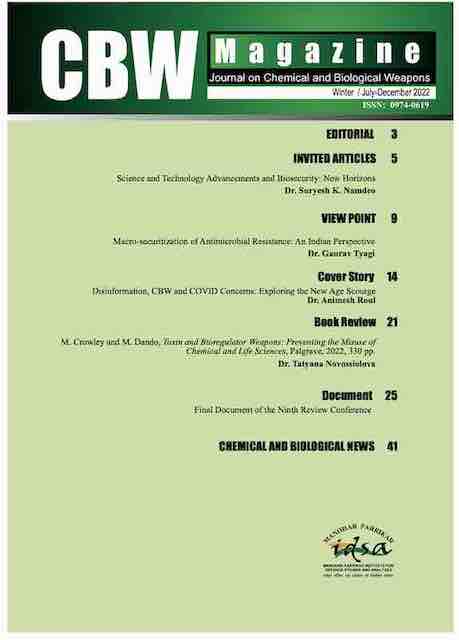Targeted and Forgotten: The Hazara Shia Community's Struggle in Afghanistan
The Hazara Shia community has endured widespread discrimination and systematic sectarian violence since the establishment of modern Afghanistan in 1747. A long history of persecution endured by the Hazara community and their status as a vulnerable ethnic group over centuries in Afghanistan is now part of Central Asia’s folklore. The Hazaras have suffered from centuries of discrimination, violence, and systemic oppression, ranging from historical atrocities under the rule of Amir Abdul Rahman to targeted attacks by the Taliban and the Islamic State of Khorasan Province.
Reuters: "Without giving evidence, Russia says it probes Ukraine use of chemical weapons"

Russia's state Investigative Committee said on Monday it was examining the alleged use of chemical weapons by Ukrainian forces near the eastern Ukrainian towns of Soledar and Bakhmut.
https://www.reuters.com/world/europe/without-supplying-evidence-russia-…
February 7, 2023
Beyond China: Exploring Asia's Emergence In Space
The 21st century is known as the Asian Century. The terminology ‘Rise of Asia’ is mostly viewed synonymously with the ‘Rise of China’. However, other Asian states are also contributing to shaping this rise. Over the past two decades, Asian countries have experienced impressive economic and technological growth. Despite the global financial crisis in the mid-2000s, Asia has managed to revive itself, albeit with limited impact.
Russia, Ukraine, and the Chemical Conundrum: Exploring the Use of White Phosphorus in Bakhmut
Bakhmut, an eastern Ukrainian city, has been enduring the consequences of Russia's aggression since the outset of the Ukraine conflict in February 2022. Once known as Artemivsk, it retained this name until 2016, encompassing both the Soviet and post-Soviet periods. During the 2014 Russian invasion of Ukraine, the Russian occupiers laid claim to Bakhmut as part of their territorial ambitions. However, the Ukrainian government managed to retake the city in mid-2014. Russia's interest in Bakhmut stems from its strategic geography, which enables them to disrupt Ukraine's supply lines.
India's Multilateralism Reform: A Flawed Strategy
Multilateral institutions are neither geographically representative nor politically democratic institutions in the contemporary scenario.
MLM: The Curious Case of Ahmed Muaz: How Islamist Groups Coopt Criminal Gangs to Advance Radicalism in the Maldives
In mid-December 2022, the Maldivian Presidential Commission on Deaths and Disappearances (DDCom) submitted its final report on the disappearance of a prominent progressive journalist, Ahmed Rilwan Abdulla. Almost eight years after Rilwan mysteriously vanished from the capital Male’s suburb of Hulhumale in August 2014, the investigating agencies have connected several missing dots to reveal how he was harassed, abducted, tortured, and decapitated (Sun, December 15, 2022).
Disinformation, CBW and COVID Concerns: Exploring the New Age Scourge

The growing trend of disinformation operations is weakening the trust in international community general and multilateral institutions in particular. The policy of biological weapons disinformation is being pursued by all the major powers, and quite interestingly, the victim of it is also from all the major global political groupings. The same is true about the Chemical Weapons Convention. As State-backed disinformation wars have become a central facet of global geopolitics, its disorderly impact on the international security environment and future challenges are yet to be decoded.
Paxton ported to drupal by DropThemes.in

